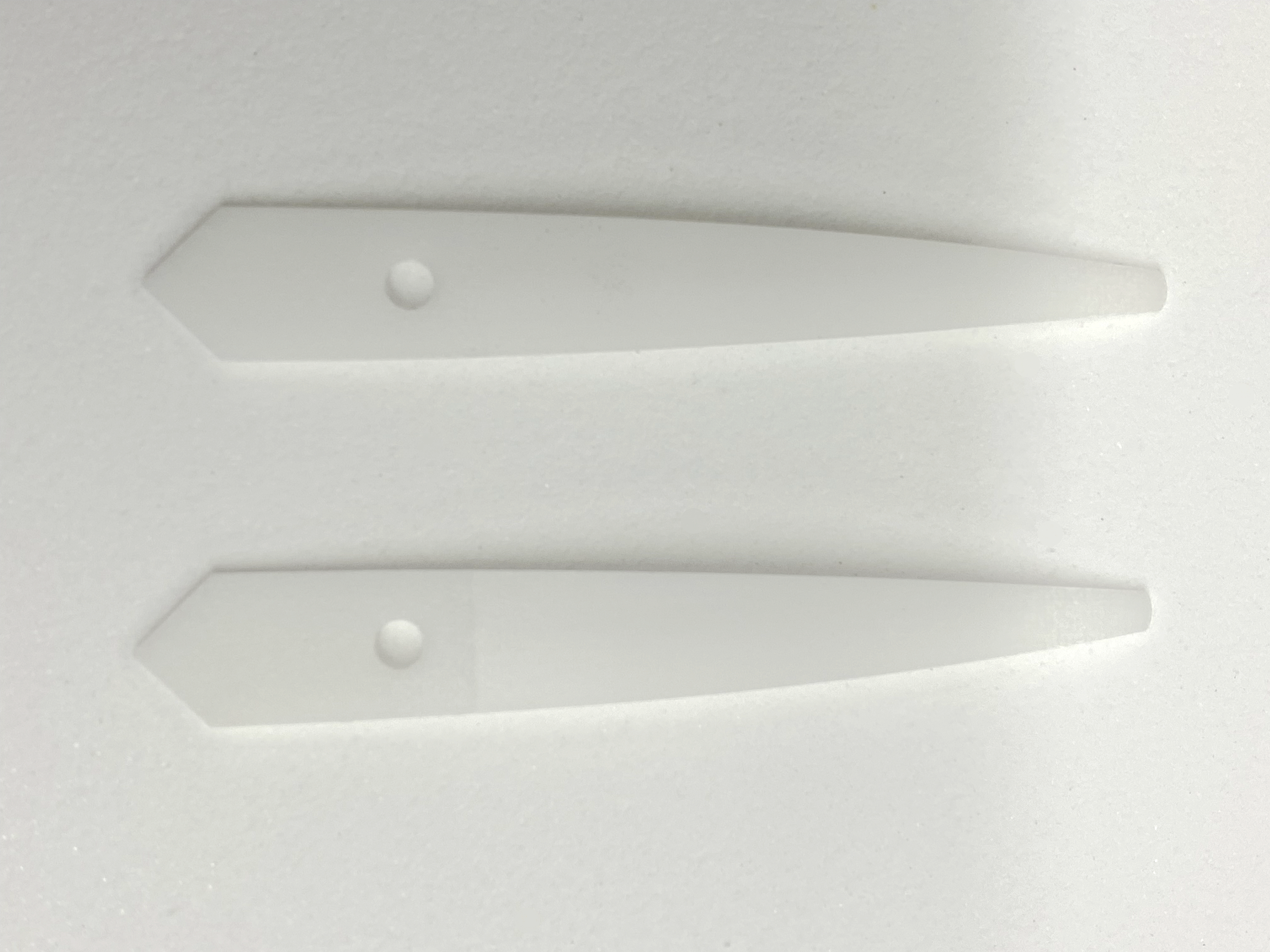Zirconia ZrO2 Ceramic CNC Machining for Medical Surgical Blades
Introduction
In the medical industry, surgical precision and reliability are paramount. Zirconia (ZrO₂), a high-performance ceramic material, delivers the mechanical strength, bio-inertness, and outstanding wear resistance required for advanced surgical instruments. This case study details our expert CNC machining processes for Zirconia, focusing on the material's properties, surface treatments, and application within medical surgery, as well as its advantages and limitations.
Manufacturing Process
Precision CNC machining for Zirconia involves specialized techniques designed to handle the hardness and brittleness of ceramics:
CNC Milling: Advanced diamond tooling and optimized parameters ensure precise complex shapes. Zirconia's high hardness demands robust equipment, making CNC milling essential for accuracy and reliability.
CNC Grinding: Essential for achieving tight tolerances and exceptional surface finishes. Grinding operations provide unparalleled precision crucial for surgical instrument components.
Precision Drilling: Accurately producing holes for precise assembly and functional precision. Zirconia drilling requires meticulous handling due to its brittleness, underscoring the importance of specialized machining.
Multi-axis CNC Machining: Allows for intricate geometries required in specialized surgical instruments, enabling complex designs crucial for advanced medical procedures.
Our machining methods ensure meticulous precision, essential for medical applications, guaranteeing consistency, repeatability, and compliance with stringent medical standards.
Material: Zirconia (ZrO₂)
Zirconia is a preferred ceramic in medical applications due to its unique properties:
High mechanical strength and fracture toughness: Zirconia outperforms traditional ceramics, offering durability even under heavy loads, making it ideal for demanding surgical applications.
Outstanding wear and abrasion resistance: Instruments maintain sharpness and precision over extended use, minimizing the need for frequent replacement.
Excellent biocompatibility and chemical inertness: Safe for prolonged contact with human tissue, minimizing the risk of allergic reactions or infections.
Low thermal conductivity and high thermal stability: Ensures structural integrity even under repeated sterilization processes, crucial for medical instruments.
These properties make Zirconia ideal for medical instruments subject to repeated sterilization and demanding surgical applications. For example, compared to traditional metals such as Stainless Steel SUS316, Zirconia offers superior biocompatibility and corrosion resistance.
Surface Treatment
Surface treatments significantly impact Zirconia's performance in medical applications:
Polishing: Achieves extremely smooth surfaces reducing friction, essential for surgical instruments such as scalpels and blades, ensuring minimal tissue trauma.
Laser Marking: Ensures clear identification and traceability, a critical requirement for regulatory compliance in medical device manufacturing.
Coatings: Specialized biomedical coatings may enhance biocompatibility, corrosion resistance, and overall performance. Thermal coatings, in particular, can boost Zirconia's durability in rigorous medical environments.
Selecting appropriate treatments ensures Zirconia components maintain their integrity and performance in critical medical environments, significantly extending instrument lifespan and effectiveness.
Industry Application
Zirconia CNC machined components are vital in various surgical and medical applications, including:
Surgical Scalpels and Blades: Precision cutting instruments requiring exceptional sharpness retention and corrosion resistance. Zirconia’s superior edge retention significantly reduces the frequency of sharpening compared to metallic instruments.
Dental Instruments: Components requiring compatibility with stringent sterilization protocols and high mechanical performance. Zirconia dental instruments offer improved patient outcomes due to their hypoallergenic properties.
Orthopedic Components: Durable, biocompatible implants and surgical tools like joint replacements or bone screws benefit from Zirconia’s high strength and chemical inertness, reducing rejection rates and enhancing patient safety.
Microsurgery Instruments: High-precision components essential for delicate medical procedures, benefiting from Zirconia's dimensional stability and smooth surface finish, which are crucial for surgical accuracy.
Medical professionals rely on Zirconia instruments for precision, reliability, and patient safety, appreciating their consistent performance and compliance with rigorous industry standards.
Advantages and Limitations
Advantages:
Exceptional mechanical strength and fracture toughness: Supports reliable, repeatable performance in demanding surgical applications, enhancing durability and instrument lifespan.
Excellent biocompatibility: Zirconia’s inertness ensures safe use within the human body, significantly reducing risks associated with allergic reactions and infections.
Superior resistance to wear, corrosion, and abrasion: Ensures longevity and performance consistency, even under harsh sterilization environments, unlike traditional metal alloys.
Thermal stability: Ensures reliable performance and dimensional stability, even in fluctuating temperature conditions during autoclaving and sterilization.
Limitations:
Higher machining complexity and cost: Zirconia’s hardness necessitates diamond tooling, advanced machining techniques, and precise parameter control, increasing the cost and complexity of manufacturing.
Brittle nature: Requires careful machining practices to avoid microfractures and ensure the structural integrity of components, demanding highly experienced CNC machining operators.
Specialized equipment and knowledge: Achieving optimal machining outcomes demands dedicated ceramic CNC machining centers and advanced training, limiting the number of capable manufacturers.
Despite these challenges, Zirconia's significant performance advantages clearly justify its usage in surgical and medical instruments. The growing demand from medical professionals demonstrates recognition of its superior properties over traditional materials.
FAQs
Why is Zirconia used for surgical instruments? Zirconia offers unmatched biocompatibility, mechanical strength, corrosion resistance, and sterilization durability, ideal for medical instruments.
What CNC machining methods are most effective for Zirconia ceramics? CNC milling, CNC grinding, precision drilling, and multi-axis CNC machining are most effective due to Zirconia’s hardness and brittleness.
How does surface treatment improve Zirconia surgical instruments? Surface treatments such as polishing and specialized coatings enhance friction reduction, biocompatibility, durability, and traceability of Zirconia components.
What challenges are associated with machining Zirconia? Challenges include material brittleness, machining complexity, higher costs, and specialized equipment and expertise requirement.
How does Zirconia compare to traditional surgical materials? Zirconia outperforms traditional materials like stainless steel in biocompatibility, corrosion resistance, mechanical durability, and sterilization compatibility.

